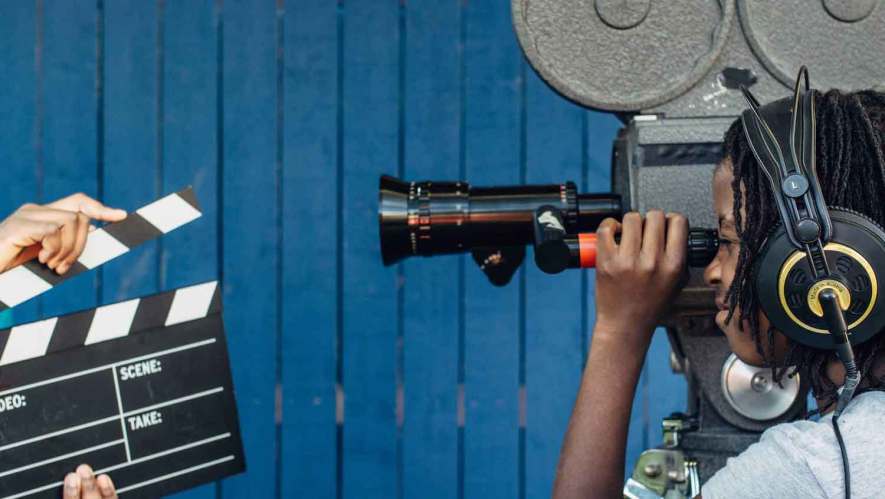“Spider-Man 3” cost $258 million. “Star Wars: The Rise of Skywalker” was $275 million. And “Pirates of the Caribbean” holds the dubious honor of the most expensive movie ever made at $376.5 million.
To the average person, these costs are astonishing, but pull back the curtain and they start to make sense. For every film or television show, hundreds (maybe even thousands) of highly skilled individuals come together to make every detail — scripts, talent development, location, cinematography, music, editing, marketing, and more — absolutely perfect.
Perfection, of course, takes time — and money. On one side of the coin, the most talented people in the world meticulously hone their craft. On the other, repetitive and often labor-intensive tasks mean long lead times and room for error. Scriptwriters search for every inconsistency, location scouts sift through thousands of possibilities to find just the right spot, and editors go frame by frame to piece the story together.
During my time working with major studios and broadcasters, I have seen the creation of innovative solutions that streamline processes and expedite production. That’s why I’m so excited about the possibilities artificial intelligence (AI) bring to the table. AI doesn’t take away from artistry: it pulls that creativity forward by alleviating the burden of time-consuming, repetitive tasks, while unlocking real business value for companies. Below are a few ways studios and production companies can use AI right now.
Productions need organized resources
Although productions like to operate independently — casting talent, hiring crews, and setting schedules — each one pulls from the same pool of resources. This may include prop houses, lighting vendors, production assistants, and the like. A comprehensive cloud-based system aggregates this kind of information into a single platform that can transform the production process.
Instead of employees digging up old contact information in their inboxes or a years-old spreadsheet with location details, data lives in one place. AI then searches and segments talent, crew members, locations, and vendors, speeding up preproduction and simplifying the entire process through post-production. Consider this: When it’s time to create the film score, AI can search massive music databases based on type and length of music and each piece’s emotional power. It surfaces options, which the composer then considers alongside their own vast knowledge of appropriate pieces, to create the final soundtrack.
Studios stay in-the-know for every production
The studios that fund, market, and distribute films and TV shows need to understand each production’s progress. Is the project on schedule? Do they need to reshoot certain scenes? Will they need more money to complete it? A shared system of data provides vital information to all stakeholders. Accountants see film budgets and expenditures in case resources need to shift. Executives stay in the loop for multiple productions at a time. Marketers consider audiences and how best to reach them. And distributors get each film out on its release date.
AI can layer into the work of each department to automate manual tasks such as data entry and scheduling. It surfaces alerts that help stakeholders with their workflows. For example, if productions fall behind schedule, AI notifies relevant parties at the studio who then adjust the timing of their own work — or call to understand the holdup. In many ways, studios and production houses get ahead of any issues before they happen.
Films and TV shows get help to reach the right audience
AI sifts through reams of past information about release successes and failures. It uses that information to help studios determine the best strategy as the release date draws near. Tools like Audience Studio help marketers A/B test content to see what resonates with different audience segments. Marketers can also use AI to personalize that content at scale, such as delivering different trailers to different viewers.
With audiences avoiding movie theaters due to the pandemic, AI also directs marketers to the platforms where they’ll find their audience (e.g., social media). Communication about the film and the premiere takes place on those platforms to create buzz. Studios can use viewer behavior to cultivate constant engagement and personalize relationships that endure over time.
Artistry reigns supreme
If AI handles the thankless tasks of a production, then the artists, craftspeople, and technicians can spend their time on what they do best. Blending art and science with AI lets studios and production companies keep up — and get ahead.
What’s next?
To learn more about how AI can help in studios and production, check out the on-demand Media Channel from the Salesforce Industries Summit. Our episode A Conversation on The Future of Content Consumption and Audience Engagement with Fox Corporation and Knotch focuses on how studios are moving business forward, and the future of audience engagement and content consumption.
Put AI to Work In Mu0026amp;E Industry Production
Help your teams unlock, understand, and take action with data















